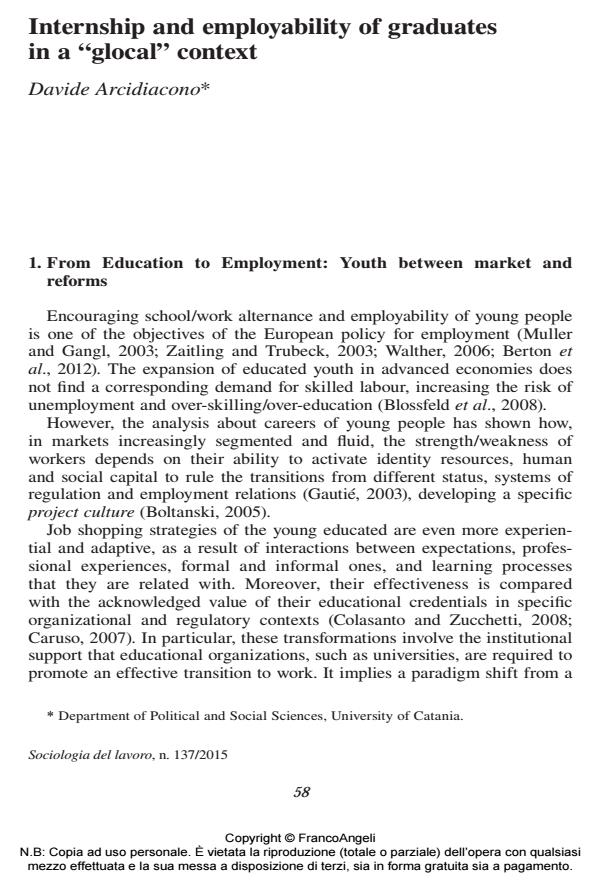Internship and employability of graduates in a "glocal" context
Journal title SOCIOLOGIA DEL LAVORO
Author/s Davide Arcidiacono
Publishing Year 2015 Issue 2015/137
Language English Pages 19 P. 58-76 File size 252 KB
DOI 10.3280/SL2015-137004
DOI is like a bar code for intellectual property: to have more infomation
click here
Below, you can see the article first page
If you want to buy this article in PDF format, you can do it, following the instructions to buy download credits

FrancoAngeli is member of Publishers International Linking Association, Inc (PILA), a not-for-profit association which run the CrossRef service enabling links to and from online scholarly content.
One of the aims of European Employment Strategy is to encourage school-towork transitions and employability of young graduates. Moreover, a stronger relationship between education and economic system is also one of the objectives of "Bologna’s Conference", in particular in the Mediterranean countries. In this scenario, internship would play a dual role: as a tool to encourage learning by doing and as an opportunity for the construction of a "professional self", especially when career paths are becoming increasingly fragmented and uncertain. European data confirm a correlation between internship and employability, but in Italy this link seems weaker. The national model of regulation and specific constraints of the local labor market play a role in making internship a less effective tool for learning and employability of graduates, particularly in South Italy. The paper aims to test this hypothesis with a survey to a sample of graduates in Catania (N = 1157). The local dimension of the investigation confirmed how processes of coercive isomorphism at European level face the attributes of the socio-institutional environment of a certain territory, affecting the learning conditions and the opportunities of employability for interns.
Keywords: School to work transitions, youth unemployment, over-education, tertiary education, placement office
- @@@Lavoratori Cercasi: un'analisi della domanda di lavoro on line ai tempi dell'e-recruitment Davide Arcidiacono, in SOCIOLOGIA DEL LAVORO 149/2018 pp.134
DOI: 10.3280/SL2018-149009 - Call centres and job satisfaction in Italy: employment conditions and socio-biographical patterns Davide Arcidiacono, Maurizio Avola, Rita Palidda, in International Review of Sociology /2020 pp.118
DOI: 10.1080/03906701.2020.1724363 - Youth condition, student movements, generations, and sociological critique Lidia Lo Schiavo, in Quaderni di Sociologia /2021 pp.187
DOI: 10.4000/qds.4805
Davide Arcidiacono, Internship and employability of graduates in a "glocal" context in "SOCIOLOGIA DEL LAVORO " 137/2015, pp 58-76, DOI: 10.3280/SL2015-137004